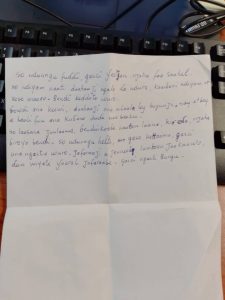Fulfulde/Fula/Peul/Pulaar/Fulani
Reading Comprehension Exercise: Seasonal Farming and Herding in Central Mali
For this lesson, we are going to focus on improving reading comprehension skills by learning about farming and herding activities during a seasonal cycle. One passage is a dialogue from A Practical Guide and Reference Grammar to the Fulfulde of the Maasina and focuses on farming; the other is a passage written by a Fulfulde teacher who grew up in a pastoralist Fulɓe community in the Maasina and focuses on herding. Although this lesson centers on reading, you should also read these passages aloud to practice your pronunciation.
Before you begin, it is important to know that central Mali has three major seasons, with shorter seasons (approximately one month each) between them. The three major seasons are:
Ndunngu – rainy season (June – September)
Dabbunde – cold season (October – February)
Ceeɗu – hot/ dry season (March – May)
Instructions
- Read the following two passages aloud without consulting the vocabulary list.
- Make a list of vocabulary words you notice in common between the two passages.
- Look at the vocabulary list for each passage.
- Read each passage a second time, writing out your own translation of each.
- After completing your translations, compare with the translations provided, then answer the following comprehension questions in full sentences. Try to answer in Fulfulde.
Demal (Farming)
Eggirgol (Major Transhumance during ndunngu)

Rewritten here for legibility: So ndunngu fuɗɗi, garci Ƴeeŋan njaha faa Saahel. So ndiyum naati daabaaji ngala ɗo ndura, kambari ndiyam e kese maaro. Benndi keddoto wuro. Ɓowdi ana keewi, daabaaji ana mbaala ley buguuji, nay e bey e baali fuu ana kuɓene duɗe naa beeku. So laasara juulaama, ɓendinkooɓe naatan laana, kirɗa, njaha ɓiroyo bendi. So ndunngu helti, gese kettama garci ana ngarta wuro. Jafaraaji e Jenneeji lumban Jaakaawo, ɗum wiyete Ƴaaral Jafaraabe – garci ngarti burgu.
Vocabulary Banks
Herding:
- Garci: Transhumancing part of the herd
- Bendi: Milk cows and calves that remain behind during transhumance
- Ƴeeŋude : to go north
- buguuji: herder’s hut
- ɓirude: to milk
- Jafaraaji: garci from Diafarabe
- Jenneeji: garci from Djenne
- Ƴaarnaade: to return first (animals-specific)
- burgu: pasture
Translations
Herding passage translation: When rainy season starts, the transhumancing herd goes north. If water appears, the animals spread out to graze there, because there is water and fields of rice. The milk cows are left near the village. There are a lot of mosquitos, so the animals spend the night in the hut, cattle, and goats, and sheet all together (near) the fire made out of wood and dung (which repels mosquitos). After the 4pm prayer, the bendi (milk cow) herders get into a boat and travel to milk the cows. When the rainy season ends, the fields are harvested, and the herd comes back to the village. Herds from Diafarabe and Djenne will swim across the Diaka river, and it is said that the Diafarabe (always) returns to the pasture first.
Comprehension Questions
- Hoɗum wiyete wakaati nde kammu ana toɓa?
- Hoto garci woni ley ndunngu? Hoto bendi woni?
- Kosaabi daabaaji ana mbaala ley luguuji?
- Hoɗum remooɓe ndema ley ndunngu?
- Ilam ana moƳƳi naa ana moƳƳa? Kosaabi?
- Hoɗum yimɓe ngaɗata e maaro ngoo?
- Hoɗum wiyete garci Ƴaaro burgu?
Answer Key:
Translation of the comprehension questions:
- What is the name of the season during which the rain comes?
- Where are the transhumance herds during the rainy season? Where are the milk cows during that time?
- Why do the animals stay in the hut with the herders?
- What do farmers plant during rainy season?
- Is flooding good or bad? Why?
- What do people do with rice?
- Which herd returns to the pasture first?
Comprehension question responses:
Please note that these responses are not definitive; check your answers with your language mentor as well.
- Wakaati o wiyete ndunngu.
- Garci Ƴeeŋan njaha faa Saahel. Bendi keddoto wuro.
- Daabaaji ana mbaala ley luguuji saabi ɓowdi ana heewi.
- Remooɓe ndema maaro ley ndunngu (e gawri e bammabaari)
- Ilam ana moƳƳi saabi maaro ana haaja ilam.
- Yimɓe ɲaama koye-maɓɓe. Ko heddii koo, ɓe cottan o.
- Garci Ƴaaro burgu ana wiye Jafaraabe.

